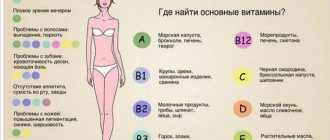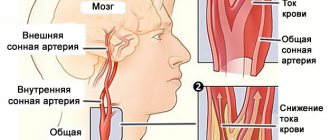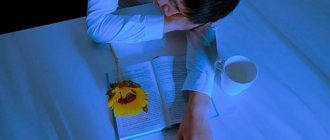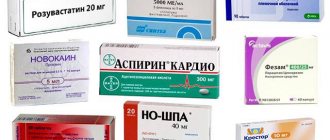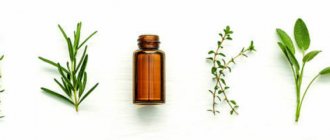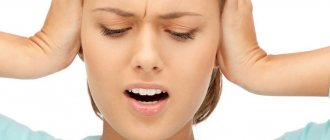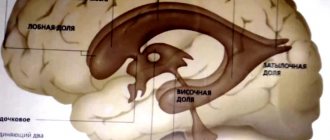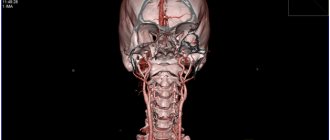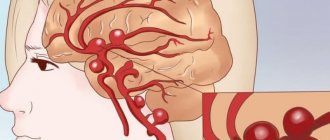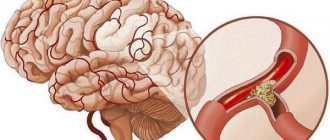Why does strength decrease?
The human vascular system is closed. The exchange of nutrients and metabolic products occurs in small structures of the microvasculature. Arteries provide blood flow from the heart, and veins return blood from peripheral tissues. The strength and elasticity of the walls of the vascular bed structures can decrease due to a significant number of different reasons:
- Exposure to adverse environmental factors (ecological deterioration, increased background radiation).
- Intoxication of the human body with various chemical compounds that have a negative effect on the vascular wall.
- Congenital weakening of the connective tissue of the walls of blood vessels, resulting from changes in the functional state of certain genes. This leads to weak blood vessels already from childhood.
- Atherosclerosis is a metabolic pathology that affects the cardiovascular system and is characterized by the deposition of cholesterol in the walls of arteries with a decrease in their strength.
- Inflammation of arteries of various origins (endarteritis).
- Inflammatory processes occurring in the veins, often of bacterial origin and leading to the intravascular formation of blood clots (the development of thrombosis).
- Degenerative-dystrophic lesion of the venous wall with weakening and formation of protrusions in varicose veins.
- Insufficient intake into the human body of compounds necessary for the normal functional state of the walls of blood vessels from food (vitamins, proteins).
- Changes in metabolism - a prolonged increase in blood glucose levels in diabetes mellitus causes vascular damage to target organs, which include the retina of the eyes, toes, heart, brain, kidneys.
An important provoking factor that reduces the strength of blood vessels, regardless of their type and caliber, is age. In men and women over 50 years of age, various vascular diseases are very common.
Strengthening blood vessels on your own
Strengthening blood vessels consists of following the principles of a healthy lifestyle: a balanced diet, physical exercise, regular water treatments, restorative massage, and the use of folk remedies.
- The first and basic rule of a healthy lifestyle is moderation . It is very important not to overeat. You should eat food 4-5 times a day. Fractional nutrition in small portions with a limit on animal fats, fried foods and simple carbohydrates is the key to good health and longevity. Coffee, soda, salt and sugar have a negative effect on blood vessels and the body as a whole. Excessive food consumption in people with vascular problems can lead to asthenia of the body, manifested by headache, malaise, and fainting. During the day it is recommended to drink up to 2 liters of water and eat plenty of vegetables and fruits. They are a source of vitamins and minerals, as well as fiber. Experts advise eating a clove of garlic every day. A glass of boiled water with lemon juice and honey, drunk at night, will help strengthen the walls of blood vessels.
- Physical activity can increase vascular tone and strengthen them . Experts recommend visiting the gym at least 3-4 times a week for 15-20 minutes. Gradual adaptation will allow you to avoid overwork and overstrain of an already worn-out vascular system. Walking, cycling, running and swimming will help strengthen bad blood vessels in the legs. To cleanse blood vessels from plaques and blood clots, you need to eat right, swim, or regularly take a simple contrast shower. Walking daily for 10–15 minutes will be beneficial in the fight for healthy blood vessels. Physical education speeds up metabolism, improves heart function, and stimulates the supply of oxygen and nutrients to the body. Non-drug treatment methods also include skiing, hiking, walking in the fresh air, and hardening procedures.
- Water procedures strengthen blood vessels well. A morning contrast shower is an excellent vascular strengthener. After such a healing procedure, the body is charged with energy, mood improves, and vascular tone is restored. In the evening before bed, a warm bath will help relieve daytime fatigue. If you are intolerant to contrast showers and hot baths, foot baths are recommended. A visit to a regular bathhouse, sauna, or swimming pool has a positive effect on blood vessels. Contrast douches strengthen and train blood vessels and the entire cardiovascular system.
- A properly performed massage helps restore the tone and function of blood vessels. Several self-massage techniques with a Kuznetsov applicator and a massage mat will strengthen blood vessels.
- People at risk should give up bad habits, especially smoking . All existing chronic and systemic diseases must be identified and treated in a timely manner. It is recommended to alternate work and rest, spend less time in front of the computer and TV, not listen to loud music, and avoid attending noisy events.
- Adequate rest and adequate sleep are the key to good health and high performance. If you constantly get upset, fear everything, worry and doubt yourself, neurosis will arise. A positive attitude and joy from every day you live will allow your blood vessels to never get sick.
Preparations for capillaries
Capillaries are the smallest vessels. They have a diameter that is equal to the size of red blood cells. The wall of human capillaries is very thin, which ensures the passage of nutrients, metabolic products (metabolism), as well as oxygen and carbon dioxide. The condition of microcirculatory structures can be improved with the help of certain medications and vitamins:
- Ascorbic acid or vitamin C is a natural compound that must be supplied to the body with food (greens, currants, onions, rose hips, citrus fruits).
- Rutin or vitamin P - refers to “vascular” active substances, reduces capillary fragility, is found in chokeberries and strawberries.
- Fat-soluble vitamin E - makes it possible to increase the strength of the walls of small vessels, as well as improve their functional condition.
- Preparations that stabilize the condition of capillary walls through organic compounds of natural origin - flavonoids (Detralex).
Symptomatic picture of vascular diseases
Strong and healthy blood vessels are the key to smooth functioning of the heart. Proper contraction and expansion of the vessel walls ensures continuous transport of blood.
Loss of flexibility and blockage of blood vessels lead to oxygen starvation
If the vessels lose their original elasticity, become too dense or fragile, various pathologies form:
- vegetative-vascular dystonia;
- migraine;
- stroke, atherosclerosis;
- vascular aneurysms;
- ischemia;
- hypertension.
Problems with the vascular system can be recognized by the following signs:
- insomnia;
- frequent dizziness;
- numbness of the limbs;
- memory impairment;
- decreased mental activity;
- cyanosis;
- tachycardia and heart pain;
- dyspnea;
- depression;
- fainting.
When disturbances in the functioning of blood vessels appear due to osteochondrosis or spinal injury, the patient will complain of severe dizziness, migraines and constant weakness.
Frequent headaches can signal vascular diseases in the body
At the first symptoms indicating a malfunction in the body, you must immediately make an appointment with your doctor. He will order a full examination of the body, collect anamnesis and prescribe appropriate vascular medications.
Medicines for arteries
A decrease in the strength of arterial vessels is fraught with the development of severe complications in the form of thrombosis and hemorrhages in tissue, including vital organs. Myocardial infarction, cerebral stroke, gangrene of limb tissue, and death of a section of the intestine are the result of problems with the arteries. You can avoid such complications with the help of a number of drugs:
- Statins are a group of drugs that reduce the concentration of cholesterol in the blood and also contribute to its partial leaching from the walls of the arteries with a reduction in atherosclerotic plaque. Medicines are prescribed only by a doctor; he determines the dose and duration of use. These include Atorvastatin tablets.
- Multivitamins - ascorbic acid, rutin, vitamin E also strengthen the arterial wall by improving metabolism in connective tissue.
- Metabolic drugs that improve metabolic processes in arterial vessels and tissues - the most widely used drugs are those that restore the functional state of tissues and blood flow in the brain (Piracetam, Cerebrolysin). In case of complicated atherosclerosis, a metabolic drug for parenteral administration (injections) Corvitin is prescribed.
- Antihypertensive drugs are medications that indirectly strengthen the arteries by reducing the blood pressure exerted on their walls (Lisinopril, Bisoprolol, Amlodipine).
- Antithrombotic drugs are medications that are taken in tablet form, reduce the functional activity of platelets (blood platelets) and prevent the intravascular formation of blood clots in the arteries (Acetylsalicylic acid).
Almost all medications are prescribed only by a medical specialist. Taking them on your own can lead to complications and negative health consequences.
Why strengthen blood vessels?
Blood vessels are hollow tubular formations through which blood moves throughout the body: from the heart to the organs (through arteries) and in the opposite direction (through veins).
Content:
- Why strengthen blood vessels?
- Vitamins to strengthen blood vessels
- Folk remedies in the fight against varicose veins
- Vitamin complexes
- Conclusion
Moreover, not only the supply of cells with nutrients, but also the regulation of tissue respiration depends on the state of the capillaries. However, as a result of age-related changes, blood vessels lose their elasticity and smoothness and stop responding adequately to changes in the intensity of blood flow. At the same time, blood circulation is disrupted, venous valves weaken, “bad” cholesterol accumulates on the walls of the arteries, and the inner surface of the capillaries is damaged. These processes underlie the development of many diseases (varicose veins, hypertension, stroke, atherosclerosis, hemorrhoids, heart attack, paralysis, ischemia, thrombosis, phlebitis).
In addition, the structure of capillaries is worsened by external factors: poor nutrition, bad habits, stress, physical inactivity, excess weight, hypovitaminosis, lack of water in the diet.
Symptoms of “bad” blood vessels:
- cold fingers and toes;
- hemorrhages on the eyeball;
- motion sickness;
- spider veins on the face, rosacea;
- fainting, dizziness;
- poor tolerance to hot weather;
- headache;
- darkness in the eyes with a sudden change in head position;
- pressure changes;
- nosebleeds;
- weather sensitivity;
- cardiopalmus;
- noise in ears.
If at least one of the listed symptoms is present, it is important to immediately consult a phlebologist or vascular surgeon (to identify the location of “weak” capillaries).
Medicines for veins
Pathology of venous vessels has become widespread. Of all the diseases, the most common are varicose veins, in which the vessels of the legs are predominantly affected, and thrombophlebitis, characterized by inflammation with intravascular formation of blood clots. Vascular strengthening medications are represented by a fairly large list:
- Multivitamins with ascorbic acid and rutin in tablet dosage form that help reduce signs of poor blood flow in small veins (the appearance of spider veins on the skin).
- Combined drugs that thin the blood and strengthen the walls of the arteries - medications are available in tablet dosage forms for systemic use (Clopidogrel) and for local external use (Heparin ointment).
- Venoprotectors are medications that improve metabolic processes in the tissues of the walls of venous vessels, thereby increasing their resistance to adverse effects, as well as the strength of the walls (Venoton, Venoplast, Venorutol).
Mechanism of action of vascular drugs
On the walls of blood vessels there are muscle fibers shaped like rings. When muscles contract, the fibers also contract, and accordingly, the clearance decreases. When the muscles are relaxed, the walls of the blood vessels expand and the lumen increases. Vascular muscles can contract independently; in addition, they are in constant tone, thanks to continuous impulses that come from the central nervous system along nerve fibers.
The action of medications is aimed at restoring blood circulation, increasing the lumen of spasmed and damaged capillaries, cleansing and strengthening the walls of blood vessels. Blood flow to the neurons of the autonomic nervous system, sensitization of metabolic processes and elimination of oxygen starvation of brain cells help improve brain function, reduce or eliminate the symptomatic picture of the disease.
General recommendations
To increase the impact of the medications in question, as well as maintain the therapeutic effects, it is important to follow a few simple general recommendations:
- Adequate sleep, which should be at least 8 hours (the optimal time for sleep is from 22.00 to 6.00).
- The predominance of plant foods in the diet, limiting the intake of animal fats, spices, marinades, and spicy dishes.
- Limiting alcohol consumption, as it is a vascular toxin and leads to a deterioration in the condition of the entire body. This also applies to nicotine, so it is better for smokers to give up the addiction that leads to nicotine addiction.
- Sufficient physical activity - morning exercises significantly reduces the risk of developing various vascular pathologies.
- Rationalization of the work and rest regime - regardless of the type of work, it is advisable to take a short break of 5-10 minutes every hour.
- Limit exposure to negative emotions and stressors whenever possible.
Following general recommendations makes it possible to keep all blood vessels healthy and prevent many diseases.
Important! Periodic intake of alcohol into the body improves the condition of blood vessels. To do this, the body has enzymatic systems that produce endogenous alcohol.
Vitamins for cleaning and strengthening blood vessels and veins
- P is effective for fragility of blood vessels, as it strengthens their structure and reduces the permeability of the walls. Based on this vitamin, many healing gels and ointments are created that are designed to reduce pain and relieve tension.
- Group B - this vitamin strengthens the walls of blood vessels and maintains their tone. It also prevents muscle weakness and helps get rid of swelling.
- B5 - with its deficiency, muscle spasms and pain appear in the arms and legs.
- C – is responsible for maintaining the functioning of the immune system and stabilizing iron levels in the blood.
Now that you already know what vitamins are needed when blood vessels burst, weakness and swelling appear, you can consider a separate list of substances necessary for the health of brain vessels.
